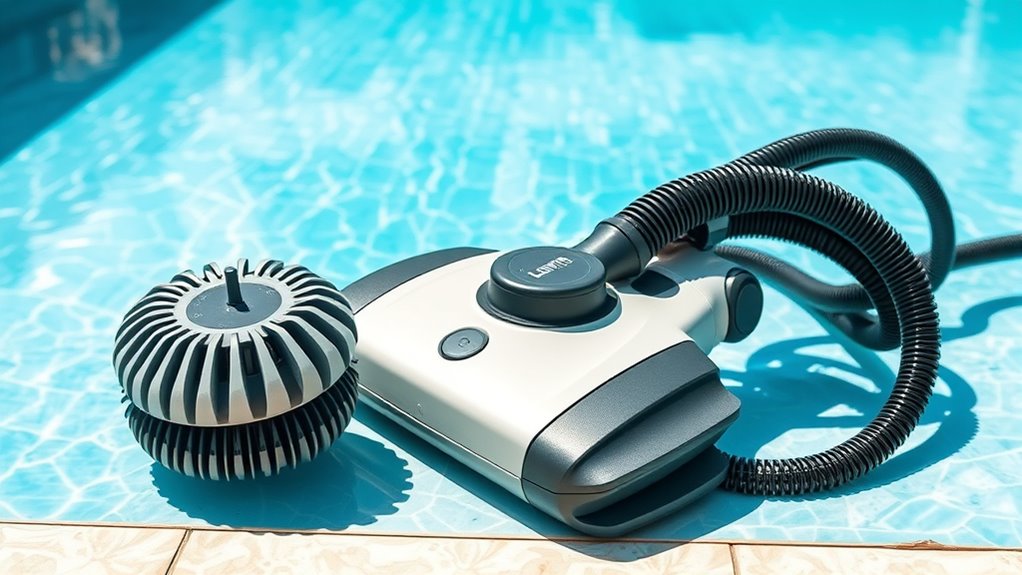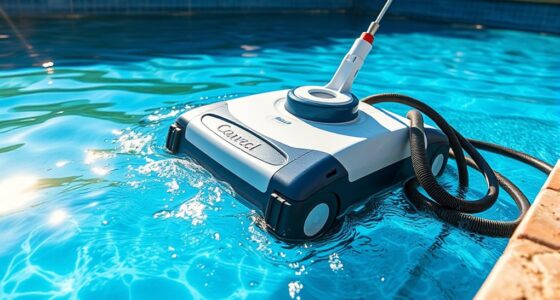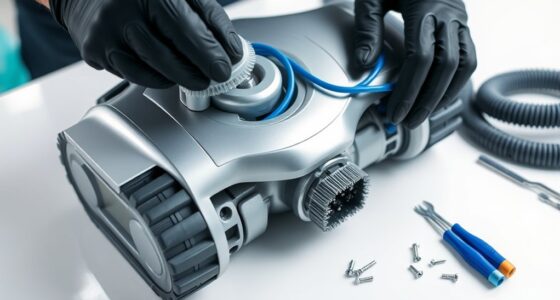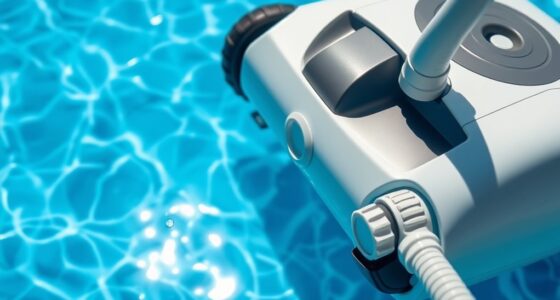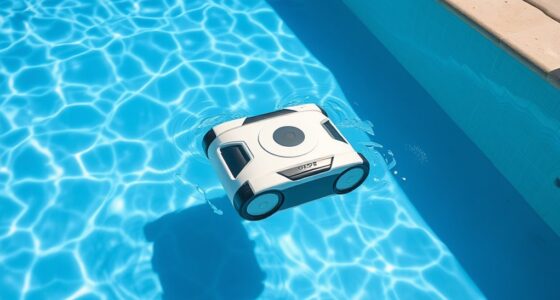You should run your suction pool cleaner at least once a week for regular maintenance, but this depends on factors like pool type, weather, and debris. During heavy debris seasons, such as fall or after storms, you might need to operate it more often. Keep an eye out for cloudy water, dirt buildup, or algae signs, which indicate your schedule needs adjusting. Discover more tips to keep your pool pristine and efficient.
Key Takeaways
- Run your suction pool cleaner weekly during peak debris seasons like summer and fall.
- Adjust cleaning frequency based on water chemistry, environment, and pool usage to prevent buildup.
- Increase cleaning during heavy debris periods or after storms to maintain water clarity.
- Reduce cleaning in winter or when debris accumulation is minimal to extend equipment lifespan.
- Monitor water quality and debris levels; clean more often if water appears murky or debris is visible.
Factors Influencing Cleaning Frequency
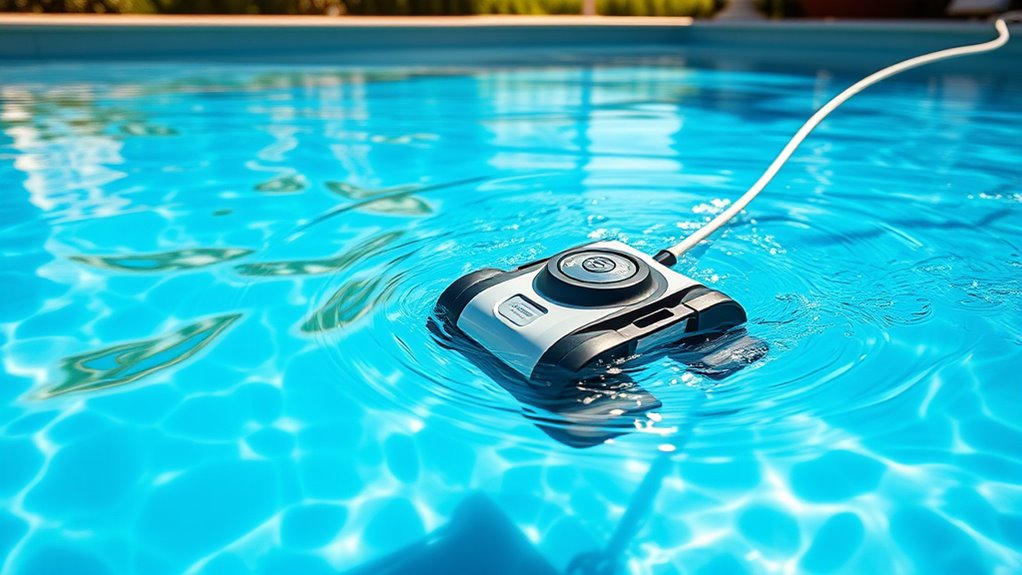
Several factors can influence how often you should run your pool cleaner, and understanding these can help you maintain a clean and healthy pool. One key factor is pool water chemistry; if your pH, chlorine levels, or alkalinity are off, debris is more likely to settle or grow, requiring more frequent cleaning. Debris accumulation also varies based on your surroundings—trees shedding leaves or dirt blowing in means you’ll need to run your cleaner more often. Additionally, the number of swimmers impacts debris buildup, as oils, sunscreens, and dirt transfer into the water. Monitoring these elements helps you decide when to run your pool cleaner, ensuring your water stays clear and safe while avoiding unnecessary use of energy or equipment wear. Regular maintenance of your portable pool equipment can also extend the lifespan and effectiveness of your cleaner. Being aware of seasonal changes can further help you adjust cleaning schedules to match environmental conditions, preventing overuse or underuse of your equipment. Moreover, the efficiency of your suction pool cleaner depends on proper setup and maintenance, which can influence how frequently it should be operated.
Recommended Schedules for Different Pool Types
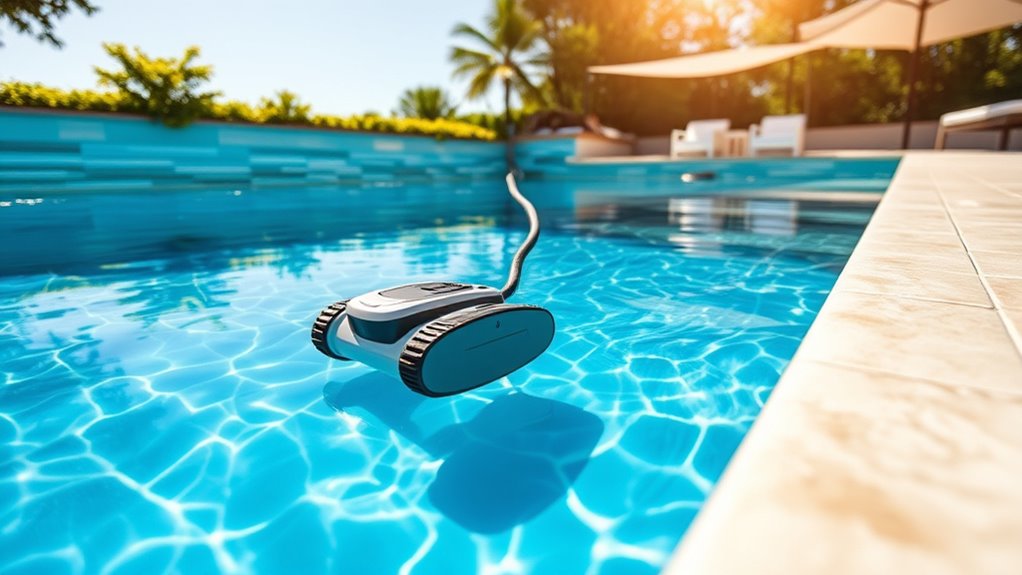
The recommended cleaning schedule for your pool varies depending on its type, ensuring ideal maintenance while avoiding unnecessary wear. In fiberglass pools, you can typically run your suction cleaner once a week since they resist algae and debris buildup well. Vinyl pools may require more frequent cleaning, especially during heavy debris periods, to maintain proper pool chemistry and prevent clogging. Concrete or gunite pools often need weekly or even bi-weekly cleanings due to higher debris accumulation and algae growth. Regular cleaning helps keep water balanced and prevents buildup that compromises pool chemistry. Additionally, using an airless paint sprayer for maintenance tasks can streamline the process of applying protective coatings or cleaning agents around the pool area. Adjust your schedule based on local environment conditions, such as trees nearby or pollen seasons. Environmental factors like debris accumulation can significantly influence cleaning frequency, so staying attentive to your pool’s specific needs is essential. Consistent cleaning prevents debris from settling, keeps the pool sanitary, and extends your equipment’s lifespan. Monitoring pool chemistry regularly can also help you optimize your cleaning routine and avoid potential issues. Being aware of symptoms of algae growth, such as slimy surfaces or green water, can also guide you on when to increase cleaning frequency.
Signs That Indicate Your Pool Needs More Frequent Cleaning
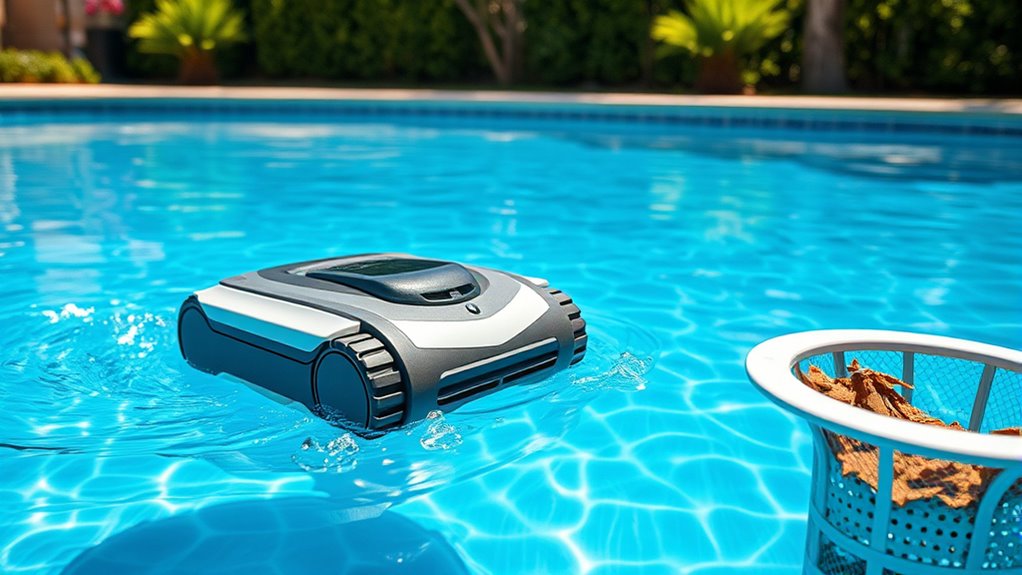
If you notice your pool water turning cloudy or murky despite regular cleaning, it’s a clear sign you need to increase your cleaning frequency. Poor water clarity often indicates that debris and dirt aren’t being removed efficiently, which can hinder robotic maintenance efforts. Additionally, uneven chemical balancing can lead to algae growth and water quality issues, making more frequent cleaning necessary. When your pool’s surface shows visible dirt or debris accumulation, it’s time to run your suction pool cleaner more often. Keep an eye on your skimmer and filter systems, as they can quickly become overwhelmed if cleaning isn’t frequently enough. Regular cleaning helps maintain chemical balance and clarity, ensuring your pool stays inviting and safe. Since consistent filter maintenance is vital, utilizing proper clog removal techniques can also extend the lifespan of your equipment and improve overall water quality. Moreover, staying attentive to the signs of contamination can help prevent costly repairs and ensure a pristine swimming environment. Maintaining a proper cleaning schedule can further optimize your pool’s health and reduce the need for extensive chemical adjustments.
Adjusting Your Routine Based on Seasonal Changes
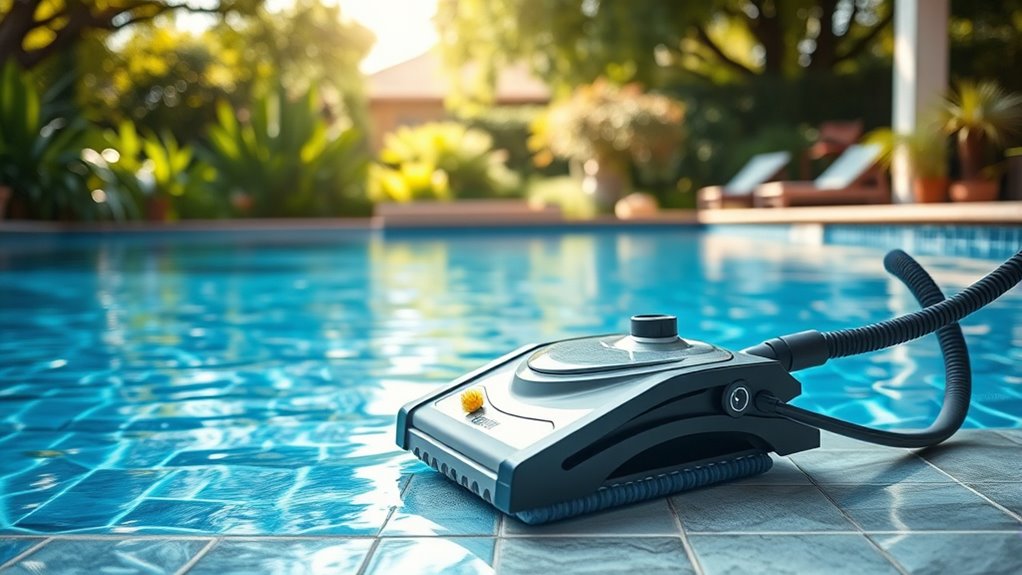
Seasonal changes considerably impact how often you should run your pool cleaner. During peak seasons like summer, you’ll need to run it more frequently to keep up with increased debris and algae. In colder months, debris accumulation slows, so reducing cleaning frequency helps prevent unnecessary wear on your equipment and supports better pool maintenance. Adjusting your routine based on seasonal factors guarantees your cleaner works efficiently and extends its equipment longevity. For example, during fall, leaves and organic matter fall into the pool more often, requiring more frequent cleaning. Conversely, in winter, you might only need to run your cleaner weekly or biweekly. Staying attentive to seasonal shifts helps you maintain a clean pool while protecting your equipment and optimizing your maintenance schedule. Additionally, understanding climate control principles can help you better anticipate how environmental factors influence debris buildup and equipment performance. Incorporating regular maintenance practices can also further enhance your pool’s cleanliness and equipment lifespan. Recognizing the seasonal cycle of debris accumulation allows you to tailor your cleaning routine effectively. Moreover, monitoring water chemistry can help prevent issues caused by inadequate cleaning schedules and ensure optimal pool health. Being aware of weather patterns can also provide insights into when additional cleaning might be necessary due to unexpected storms or heavy rainfall.
Tips for Efficient Use of Your Suction Pool Cleaner
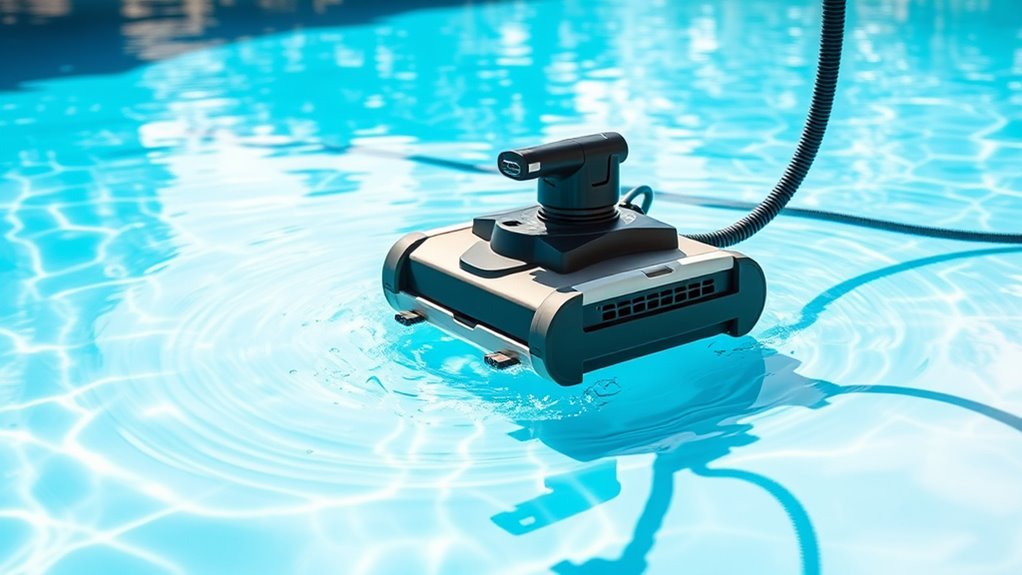
Maximizing your suction pool cleaner’s efficiency starts with proper setup and operation. Keep your pool’s chemical balance in check to prevent debris buildup and ensure smooth cleaning. Regular pool cover maintenance reduces dirt and leaves entering the water, easing the cleaner’s workload. To optimize performance, consider the following:
| Tip | Why It Matters | Best Practice |
|---|---|---|
| Maintain proper chemical levels | Prevents algae and debris accumulation | Test weekly and adjust chemicals accordingly |
| Clean or replace filters regularly | Keeps suction strong and effective | Check filters every 2-3 weeks |
| Use a clean pool cover | Reduces debris entry, easing cleaner’s task | Remove debris from cover weekly |
| Be aware of narcissistic behaviors that can influence family dynamics, which may indirectly affect pool maintenance routines and household harmony. | Recognizing family dynamics helps maintain a harmonious environment that supports regular pool care. |
Adding a consistent maintenance routine ensures your pool remains clean and the cleaner functions at peak performance, preventing costly repairs. Additionally, inspecting your vacuum hoses regularly can help prevent clogs and maintain optimal suction power.
Frequently Asked Questions
Can I Run My Suction Pool Cleaner Every Day?
Running your suction pool cleaner daily isn’t necessary and can increase your energy consumption. Instead, follow a maintenance schedule that suits your pool’s size and usage. Typically, running it 2-3 times a week keeps your pool clean without overworking the cleaner or raising energy costs. Adjust based on debris levels and weather conditions, ensuring your pool stays pristine while conserving energy and extending your equipment’s lifespan.
Does Pool Size Affect Cleaning Frequency?
Pool size impacts your cleaning routine, affecting how often you should run your suction pool cleaner. Larger pools with greater capacity require more frequent cleaning to maintain clarity, prevent debris buildup, and guarantee ideal cleaning efficiency. Smaller pools, on the other hand, may need less frequent attention. By considering your pool’s capacity, you can tailor your cleaning schedule to keep your pool sparkling and functioning efficiently.
How Does Weather Impact Cleaning Schedule?
Weather impact influences your pool cleaning schedule considerably. During rainy or windy days, debris accumulates faster, so you might need to run your suction pool cleaner more frequently. Seasonal adjustments are also essential; in fall, you’ll likely need more frequent cleaning due to falling leaves, while in winter, less frequent runs might suffice. Monitoring weather patterns helps you decide when to run your cleaner, ensuring your pool stays clean year-round.
Is It Okay to Run the Cleaner Overnight?
You might wonder if it’s okay to run your suction pool cleaner overnight. The truth is, it’s generally fine and can support automatic maintenance, keeping your pool pristine without daily effort. Running it overnight also improves energy efficiency, as off-peak electricity rates often apply. Just guarantee your system has proper ventilation and safety measures. This way, you maximize cleaning and convenience while keeping your pool in top shape around the clock.
Should I Clean the Cleaner’s Filter Regularly?
You should clean your suction pool cleaner’s filter regularly to prevent debris buildup, which can reduce cleaning efficiency. Check the filter after each use and wash it with a hose to remove dirt and debris. Regular filter maintenance keeps your cleaner working effectively, extends its lifespan, and ensures your pool stays cleaner longer. Don’t wait for noticeable problems; routine cleaning is key to maximum performance.
Conclusion
In the end, keeping your pool sparkling is all about finding the right balance, like a good Shakespearean sonnet. Regularly running your suction pool cleaner keeps debris at bay and saves you from a watery mess. Watch for signs it needs more attention, especially during seasonal shifts. With a little effort, you’ll enjoy crystal-clear water and feel like a poolside hero. Remember, even the Bard would agree—consistency is key to a pool that’s fit for a king.
